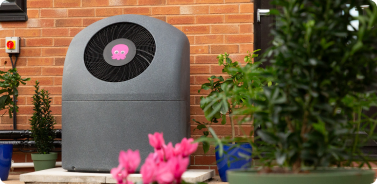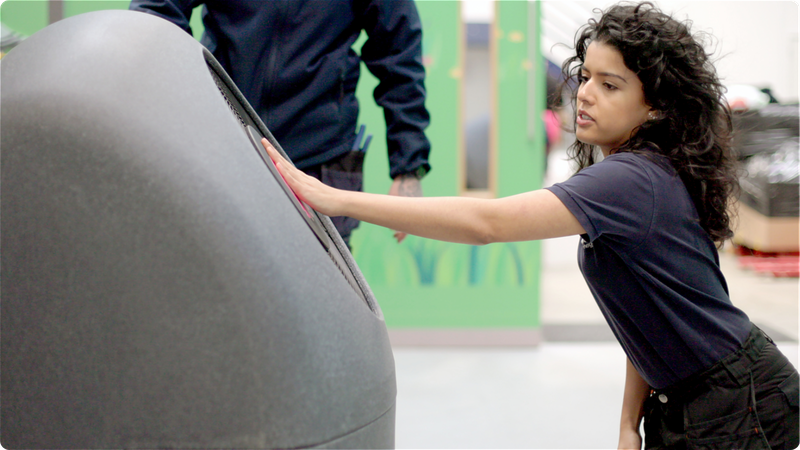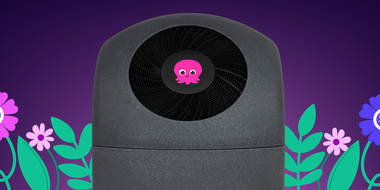Can heat pumps clean the air in your community?
As the UK's weather gets hotter, stormier, and a bit less predictable, our communities are feeling the strain. Poor air quality affects everyone, from busy city centers to quiet residential streets, and the heating choices we make in our homes play a bigger role than you might think.
According to the UK Health Security Agency, we spend a whopping 95% of our lives indoors, but the air we breathe outside matters just as much. Every time we step out our front door, walk to the shops, or open our windows, we're breathing the air our entire community shares.
Air source heat pumps like the Cosy system often get credit for being environmentally friendly, but what's their real impact on the air quality in your neighbourhood? We spoke with an expert who's dedicated her career to making clean air a reality for everyone.

Meet the expert
Georgina McGivern is the Co-Founder and Programme Director of The London Clean Air Initiative, a non-profit organisation dedicated to improving air quality across London.
Since its founding five years ago, Georgina has played a central role in shaping the organisation's strategy and delivering impactful programmes that raise awareness, influence policy, and drive community-led change.
How exactly can switching to a Cosy heat pump help clean your community's air?
We know heat pumps are efficient, but do they actually improve the air everyone breathes?
Georgina: Absolutely, and this is one of the most compelling reasons to make the switch. Unlike traditional gas boilers that burn fuel and release emissions, Cosy heat pumps use electricity to transfer heat from the outside air. This means zero direct emissions from your heating system. Research shows that this isn't just theoretical - it delivers real, measurable health benefits worth millions in avoided healthcare costs each year.
In London, gas boilers and cookers are responsible for over 20% of nitrogen oxide (NOx) emissions, a key contributor to poor air quality and conditions like asthma. When you multiply this across a neighbourhood, the impact is significant. By moving from gas to electricity, we can cut those emissions significantly. Heat pumps not only help stop the problem from getting worse, they also deliver direct, positive health impacts for the people living in those homes. Source: Cleantech Homes, The Sustainable Markets Initiative
What kind of pollutants are we talking about?
What exactly gets pumped into our community air from traditional heating?
Georgina: Gas boilers release several harmful pollutants directly into the outdoor air, including nitrogen oxides (NOx), carbon dioxide, and particulate matter. These pollutants don't just disappear - they contribute to the smoggy days, trigger asthma attacks, and create the poor air quality that affects everyone in your community.
The beauty of a Cosy heat pump is that it produces zero of these emissions. While it uses electricity, when that comes from an increasingly clean grid with more renewable energy, the overall impact keeps getting better.
A team of scientists from Turin, Italy, found that replacing domestic gas boilers with heat pumps could cut average annual NOₓ concentrations by up to 1.4 µg/m³, delivering measurable health benefits worth millions in avoided health costs each year. For households in smaller or tightly sealed homes, where pollutants can build up more quickly, that switch can make an especially noticeable difference. Source: National Centre for Biotechnology Information
Is switching from a gas boiler to a heat pump better for air quality inside the house?
Many homes still rely on gas, but does ditching the flame-based system make a noticeable difference to indoor air?
Georgina: Gas boilers have a negative effect on the outdoor air quality, but provided they are not faulty they won’t impact the indoor air quality. However, gas cookers are a significant source of indoor air pollution, releasing harmful by-products such as nitrogen dioxide (NO₂), carbon monoxide (CO), and fine particulate matter. NO₂ is strongly linked to asthma and other respiratory problems, with indoor levels often far exceeding outdoor air after cooking. Health experts and public health organisations increasingly recommend switching from gas to electric or induction cooktops, which eliminate combustion-related emissions. At a minimum, it is vital that if cooking on gas you open the window to reduce the build up of NO₂.

Does eliminating gas heating really make a community-wide difference?
One house switching seems like a drop in the ocean - does it actually matter?
Georgina: Every single switch matters, and here's why: air pollution is often hyperlocal. The emissions from your neighbour's boiler will affect the air quality around your homes, schools, and local shops first. When entire streets or neighbourhoods start switching to clean heating like Cosy systems, you can improve air quality for everyone.
It is important however to consider this switch as of one of many positive changes you can make to reduce air pollution. Vehicle emissions for example are still the leading source of air pollution in London. Making better travel choices such as choosing active travel whenever possible or switching to a low emission vehicle for essential journeys can have a significant impact on your local air quality. When combined, changing how you travel and how you heat your home can be one of the most meaningful ways you can improve air quality.
What role does the electricity grid play in this?
If Cosy runs on electricity, doesn't that just move the pollution elsewhere?
Georgina: This is a great question, and the answer keeps getting better. The UK's electricity grid is rapidly cleaning up - we're generating more power from wind, solar, and other renewable sources every year. Even when electricity comes from gas power stations, large-scale generation is much more efficient and cleaner than thousands of individual gas boilers across a city. With a Cosy heat pump, you're immediately eliminating local pollution while supporting a grid that's getting cleaner every year.
How does this compare to other ways of improving community air quality?
Are heat pumps just one small piece of a bigger puzzle?
Georgina: When residents both reduce vehicle emissions, by driving less, switching to electric vehicles, or using public transport, and replace combustion-based home heating with a heat pump, the combined impact on air quality can be significant. Cars and gas boilers are two of the largest local sources of nitrogen dioxide (NO₂), carbon monoxide (CO), and fine particulate matter (PM₂.₅), all of which are strongly linked to respiratory and cardiovascular disease. By cutting out exhaust fumes on the road and eliminating indoor and outdoor emissions from burning gas at home, residents not only lower greenhouse gas emissions but also reduce harmful pollutants in the spaces where they and their neighbors live and breathe every day. This dual shift helps create cleaner, healthier air across the wider community, lowering risks of asthma, heart disease, and premature death while also supporting climate goals.
Can using a heat pump actually help with asthma, allergies or respiratory issues?
Asthma, allergies, and respiratory issues are some of the most common effects of air pollution on our health. By switching to cleaner, electric solutions such as heat pumps, residents can lower the levels of NO2, CO2, and particulate matter that is being emitted into their communities.
According to the American Lung Association, fuel-burning appliances release harmful pollutants like nitrogen dioxide and carbon monoxide, which can trigger asthma, lung disease, and other serious health problems. Their advice? Switch to clean, electric solutions like heat pumps. Heat pumps deliver year-round comfort without releasing indoor pollutants, and they improve air quality with built-in filtration and humidity control. It’s a win for your health, your home, and the planet.
Source: The American Lung Association
Does maintaining my Cosy system help keep community air clean?
Is this a "set it and forget it" solution for cleaner air?
Georgina: The great news is that a well-maintained heat pump continues to produce zero local emissions throughout its lifespan. Regular servicing ensures it runs efficiently, which maximizes both your energy savings and your positive environmental impact. Unlike gas boilers that can develop issues or faults over time that increase the amount of emissions being emitted, a properly maintained heat pump keeps delivering the same clean air benefits year after year.

Is improved air quality a reason to choose a heat pump, or just a nice bonus?
We know heat pumps are green and efficient, but should clean air be part of the decision?
Georgina: Improved air quality is definitely a nice bonus and should be seen as part of the decision to make the switch. In addition to energy efficiency and lower carbon emissions, switching from a combustion-based system has significant and meaningful air quality gains.
In London, buildings are responsible for a significant amount of outdoor air pollution. Heat pumps can reduce air pollution by eliminating the combustion emissions associated with traditional heating systems. By using electricity to transfer heat rather than burning fossil fuels, heat pumps avoid releasing harmful pollutants like nitrogen oxides, sulfur dioxide, and particulate matter into the atmosphere. This means that by switching to a heat pump, you are reducing your impact on local air quality, which can in turn improve the air quality inside your home.
And one for us! Can switching to Cosy inspire others in my community?
Does individual action really lead to bigger change?
Octopus Energy: Absolutely! We see this all the time - when one household makes the switch to clean heating, neighbours start asking questions. They see the benefits, hear about lower energy bills, and realise it's not as disruptive as they thought.
Heat pumps are visible technology - your neighbors will notice the outdoor unit and may ask about your experience. This creates opportunities to share what you've learned and encourage others to make the switch. Before you know it, you're part of a community-wide transformation toward cleaner air.

Curious what others think?
Dive into our heat pump reviews and see how real Octopus customers made the switch, and never looked back!
Bottom line: Is cleaner community air a good reason to choose Cosy?
Community air quality should absolutely be part of your decision. While the energy savings and home comfort benefits are excellent, the positive impact on your neighborhood's air quality is immediate and significant.
Every time you heat your home with a Cosy system instead of a gas boiler, you're actively making the air cleaner for everyone around you - your neighbors, local school children, elderly residents, people with respiratory conditions. You're contributing to a healthier, more livable community.
In areas where many homes make this switch, the cumulative effect creates meaningfully cleaner air that benefits everyone. You're not just investing in your own home - you're investing in your community's health and future.

Back to you
So, can your Cosy heat pump really help clean your community's air? The answer is a resounding yes. Every day your heat pump operates instead of a gas boiler, you're eliminating harmful emissions that would otherwise affect the air your entire neighbourhood breathes.
Beyond keeping your home comfortable and your energy bills low, you're actively contributing to cleaner air for local schools, parks, shops, and everyone who calls your community home. It's efficient heating that makes your neighbourhood a healthier, more pleasant place to live - for everyone.
When you choose Cosy, you're not just upgrading your home's heating system. You're becoming part of the solution to cleaner air in your community, creating a better environment for current residents and future generations alike.
Ready to make the switch to a heat pump?
Knowledge is power ⚡️



Published on 20th August 2025 by:
Hey I'm Constantine, welcome to Octopus Energy!
×Close window
